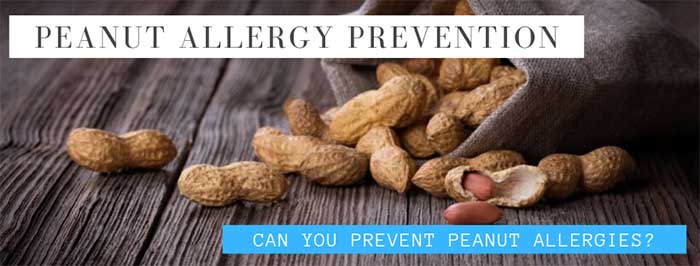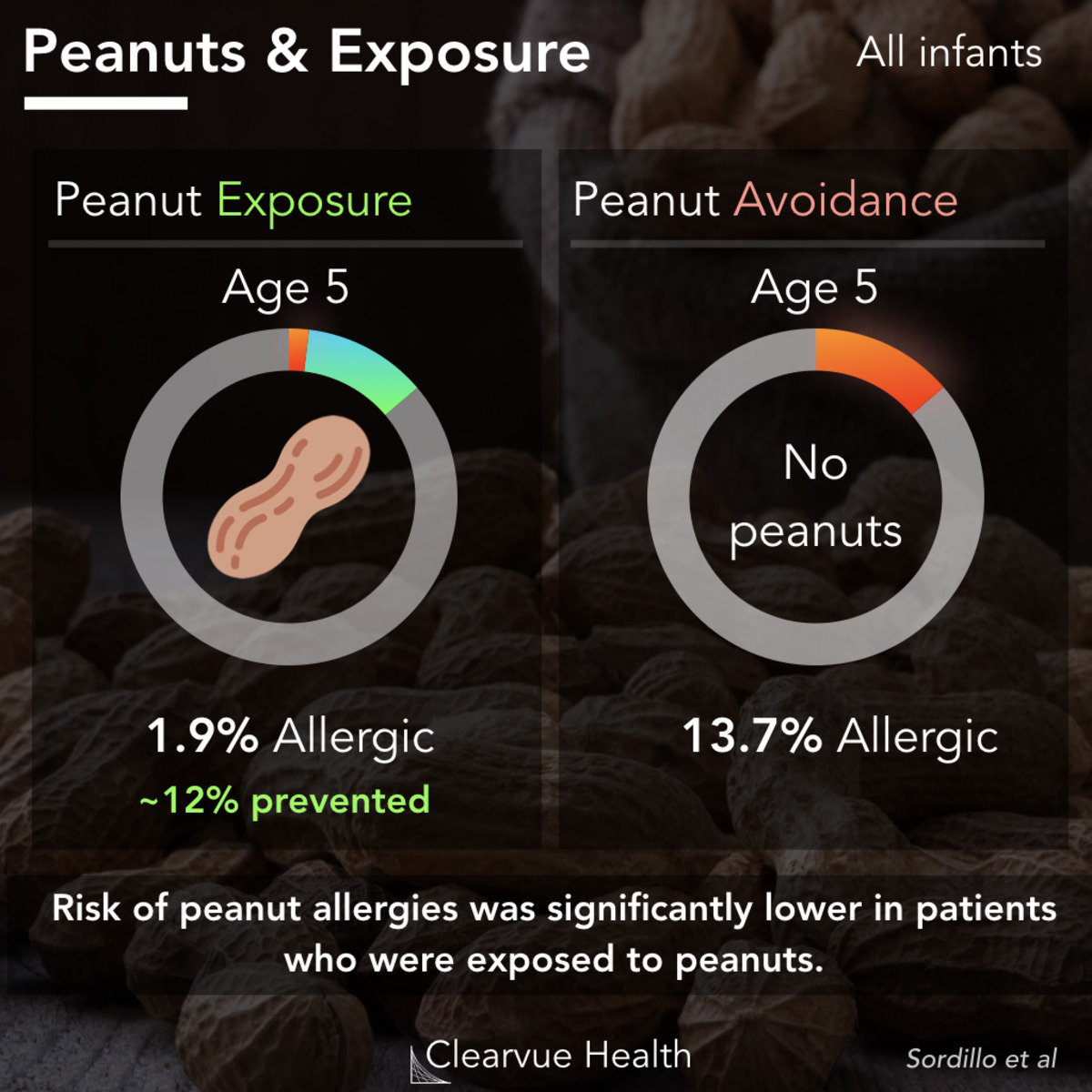does breastfeeding prevent peanut allergy
Breastfeeding certainly plays a role in allergy prevention as do other infant dietary and environmental and health care factors. If you eliminate these foods from your diet the proteins will disappear from your breast milk in 1-2 weeks and the babys symptoms should slowly improve.

Peanut Butter Common Food Allergies Most Common Food Allergies Peanut Butter Sandwich
Another expert Marc E.

. Does Breastfeeding Prevent Peanut Allergy. The timing of introduction of solid food on the subsequent development of food allergy is under debate and the role of concurrent breastfeeding is unclear. However there is strong evidence to show that introducing allergens to your baby starting at 4 months old can help prevent food allergies.
Exposure via breastfeeding and early introduction can reduce sensitization symptoms from eating the food will likely be inconsistent but there is still not a solid answer in terms of reducing food allergy. However even though moms pass food proteins to their babies through breastmilk there is inconclusive evidence to show that breastfeeding alone can help prevent food allergies. Today guidelines from the National Institutes of Allergy and Infectious Diseases are endorsed by the American.
Watch At Your Own Pace. An updated clinical report from AAP reviews whether breastfeeding can prevent certain allergies and how early peanut feeding can help prevent a peanut allergy. The aim of the present study was to investigate the role of solid food introduction whilst concurrently breastfeeding on.
Common allergens include dairy eggs fish shellfish peanuts tree nuts wheat and soy 1. On contrary according to the Journal of Allergy and Clinical Immunology research findings nursing mothers could help protect their babies from developing allergies by eating peanuts while they are breastfeeding. When your baby is ready at around 6 months but not before 4 months start to introduce first foods including peanut such as smooth peanut butterpaste and well-cooked egg.
When mothers choose to breastfeed babies can have lower risks for a number of disease conditions which may include reducing the risk of eczema a risk factor for developing food allergies. Delaying the introduction of the common allergy causing foods does not prevent food allergy. The mothers of peanut-allergic infants were 23 times more likely to have consumed peanuts during breastfeeding than mothers of the control infants although peanut ingestion during pregnancy was a stronger predictor of peanut allergy12.
Does eating peanuts while breastfeeding prevent peanut allergy. Theres no strong evidence to suggest that breastfeeding can help prevent allergies. Feeding infants peanut products from ages 4 to 6 months may prevent them from developing a peanut allergy says Avraham.
Perhaps someday we will have comprehensive recommendations for families on how to prevent childhood allergies asthma and eczema. Prevent Peanut Allergies Change your childs future Evidence continues to build about allergy prevention Experts base their recommendations on the groundbreaking LEAP Study in which early introduction reduced development of a peanut allergy by up to 86 percent. Proteins from the foods that you eat can appear in your milk within 3-6 hours after eating them.
Breast Milk Can Prevent Childhood Allergies - Reduce the risk of infant food allergies and does breastfeeding. Look up for Quick Answers Now. A study was recently published in the journal Clinical and Experimental Allergy entitled The association between infant feeding practices and subsequent atopy among children with a family history of asthma This study performed by researchers in Sydney Australia evaluated the effectiveness of breastfeeding and delaying the introduction of solid foods on.
Babies can develop allergies to foods that you are eating while you are breastfeeding. Why Does breastfeeding protect against allergies. Restricting peanut while breastfeeding is not recommended as it does not prevent peanut allergy Boyce 2011Kramer 2012.
Does breastfeeding prevent peanut allergy. Many parents think they can keep their child from getting a peanut allergy if they dont give him peanuts until he is older. Learn Everything You Need To Know From A Top Lactation Consultant.
Good nutrition early in life can set the stage for a healthy adulthood and help children avoid a number of allergic conditions according to an updated clinical report from the American Academy of Pediatrics. This means theres a good chance your baby will not be sensitive to these foods you or your babys father are sensitive to later in life if they are breastfed. Introduction of peanut In 2000 the American Academy of Pediatrics AAP published recommendations to prevent food allergy in infants at risk for allergic disease.
So to help reduce the risk of developing food allergies by up to 80 parents should introduce allergenic foods to their baby early and often in addition to breastfeeding. But research shows kids are better off if they eat peanut products very early in life. Rothenberg MD says it still remains to be proven if the amount of peanut protein found in breast milk is sufficient.
The infants immune system then takes up these protein-antibody complexes which triggers the babys immune system to produce cells that help protect against allergic reactions. Check out now the facts you probably did not know about. No differences were noted in infant age sex ratio breastfeeding and several other variables.
Online Breastfeeding Courses Taught By A Top Lactation Consultant. If you dont love peanuts dont force yourself to eat them. Continuing to breastfeed at the time of peanut introduction at 6 months of age has been shown to reduce the risk of peanut allergy.
Breastfed infants who need ongoing formula supplementation and who are at higher risk for food allergies should be given hypoallergenic formula to prevent cows milk allergy. Discover all the Benefits that you might get. Breastfeeding may boost a babys immune response.
Beyond breastfeeding parents can help reduce the risk of a child developing peanut allergies through early introduction of peanut foods around 4-6 months depending on a. Ad Refer Back Any Time. The key to introducing your baby to new foods is to do so gradually.

Leading Allergist Explains New National Recommendations For Prevent Peanut Allergy Peanut Allergy Allergies Peanut Butter Allergy

Guidelines And Research On Preventing Peanut Allergy Managing Peanut Allergies

How To Feed Your Baby To Prevent Peanut Allergy

Food Allergy Fun Cartoon Food Allergies Food Allergy Mom Food Allergies Awareness

Pin By Heather Springer On Allergy In 2021 Starting Solid Foods Introducing Solids Variety Food

National Breastfeeding Awareness Month Q A With Dr Jj Levenstein Managing Peanut Allergies

Guidelines And Research On Preventing Peanut Allergy Managing Peanut Allergies

27 Helpful Charts For Breastfeeding Moms Baby Infographic Baby Food Recipes Baby Eating

Peanut Allergy Prevention Can You Prevent Peanut Allergies

Prevention Prevent Food Allergies

New Guidelines Detail Use Of Infant Safe Peanut To Prevent Allergy American Academy Of Pediatrics Prevent Allergies Allergies Severe Eczema

Preventing Peanut Allergies Around The World Managing Peanut Allergies

Peanut Allergy Treatment Exposure Therapy Visualized Health

Peanut Allergy La Leche League International

Ready Set Food Allergen Introduction For Babies Shark Tank Products Prevent Allergies Food Allergies Dieting While Breastfeeding

Mission Mightyme Proactive Peanut Puffs With Purpose Peanut Allergy Kid Friendly Meals Food Allergies

Big 8 Allergins Baby Food Allergies Food Allergies Awareness Food Allergies

What Are The Top 8 Food Allergens Food Allergies Awareness Food Allergens Food Allergies Kids

Food Allergy Anaphylaxis Prevention Latest Research Of Food Allergy Prevention Prevent Allergies Allergies Prevention